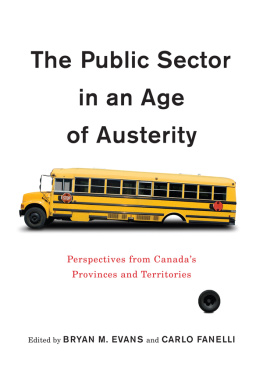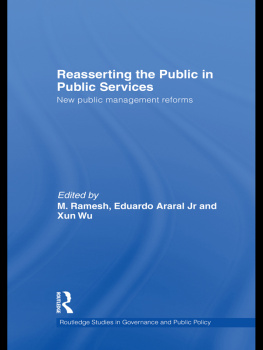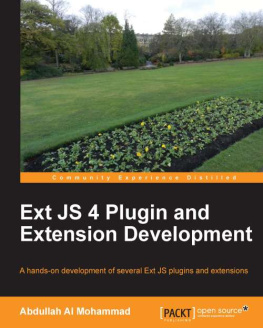
PRIVATIZATION AND THE CRISIS OF AGRICULTURAL EXTENSION
King's Soas Studies in Development Geography
Series Editors:
Robert W. Bradnock and Kathy Baker-Smith
Both the School of Oriental and African Studies and King's College, whose geography departments have recently merged, have established international reputations for their research into these areas. This series publishes original research into all aspects of geography in the developing world, particularly linking environmental and development issues. It will be of critical interest to geographers and academics in the fields of development studies, political science, environmental studies and economics.
Also in the series
Environment, Knowledge and Gender
Local Development in India's Jharkhand
Sarah Jewitt
NGO Field Workers in Bangladesh
Mokbul Morshed Ahmad
Perspectives of the Silent Majority: Air Pollution, Livelihood
and Food Security
Indepth Studies through PRA Methods on Community Perspectives in Urban
and Peri-Urban Areas ofVaranasi and Faridabad, India
Amitava Mukhetjee
Wide Crossing
The West Africa Rice Development Association in Transition, 1985-2000
John R. Walsh
Water Stress: Some Symptoms and Causes
A Case Study of Ta'iz, Yemen
Chris D. Handley
Global Thinking and Local Action
Agriculture, Tropical Forest Loss and Conservation in Southeast Nigeria
Uwem E. Ite
A Clash of Paradigms: Intervention, Response
and Development in the South Pacific
Susan Maiava
Privatization and the Crisis of Agricultural Extension
The Case of Pakistan
Andrew P. Davidson
University of New South Wales, Australia
Munir Ahmad
Agricultural University, Pakistan
First published 2003 by Ashgate Publishing
Reissued 2018 by Routledge
2 Park Square, Milton Park, Abingdon, Oxon OX14 4RN
711 Third Avenue, New York, NY 10017, USA
Routledge is an imprint of the Taylor & Francis Group, an informa business
Copyright Andrew P. Davidson and Munir Ahmad 2003
The authors have asserted their moral right under the Copyright, Designs and Patents Act, 1988, to be identified as the authors of this work.
All rights reserved. No part of this book may be reprinted or reproduced or utilised in any form or by any electronic, mechanical, or other means, now known or hereafter invented, including photocopying and recording, or in any information storage or retrieval system, without permission in writing from the publishers.
Notice:
Product or corporate names may be trademarks or registered trademarks, and are used only for identification and explanation without intent to infringe.
Publisher's Note
The publisher has gone to great lengths to ensure the quality of this reprint but points out that some imperfections in the original copies may be apparent.
Disclaimer
The publisher has made every effort to trace copyright holders and welcomes correspondence from those they have been unable to contact.
A Library of Congress record exists under LC control number: 2002027787
ISBN 13: 978-1-138-72045-9 (hbk)
ISBN 13: 978-1-315-19381-6 (ebk)
The concept 'development' has long been the subject of debate and is as old as the field of sociology itself. Social change or development implies a transformation in people's institutions, cultures, organizations, values, and attitudes. But, as is becoming increasingly obvious, social change does not proceed in a straightforward manner and is in fact an uneven process. What the development debate also suggests is that the issues involved in social transformation particularly those associated with modernity and postmodernity - are extremely complex and multi-dimensional and thus require far more sensitive theorization, moving beyond a single deductive logic which identifies variation as systematic, but which theorizes it as unique or anomalous. Furthermore, not all people experience the effects of the development process equally. Ultimately, what we are concerned with is coming to terms with the various meanings and manifestations of development. In this respect, we begin by asking three broad questions (Currey 1973):
- Who is development for, who will benefit from it, and who will bear the costs?
- How is development to be affected?
- What is the nature of the society it is expected to emerge at the end?
Development is thus both a means and an end. For this reason it is often necessary to focus on specific processes and problems associated with development. But no matter how we conceptualize development, what we must be constantly aware of is that development has real consequences for real people. In some instances people find that they enjoy a new array of opportunities and choices, while others find new patterns and mechanisms of constraints. What this says is that development is neither obvious nor intuitive if for no other reason than development has many interrelated elements.
We chose to explore development by focussing on agricultural extension. The genesis began with a conversation Munir and I had in Australia about privatization and what this means for the flow of information and services to farmers. Munir had been an extension field officer in Pakistan for several years before taking up a teaching post at the University of Agriculture in Faisalabad. We had many questions and concerns and so decided to embark on this project. While we started out questioning the merits of public (the Department of Agriculture) and private or commercial (Ciba) extension sectors in delivering information and services to farmers, towards the end we began asking ourselves whether or not extension in either form had ultimately failed most farmers. And if so, where would farmers turn to? These are not easy questions nor are there any ready solutions. Throughout the course of fieldwork and in my subsequent trips to Pakistan, Munir and I continued to debate the topic. We still have no universal formulas for how to do it but what we do have is a better understanding of the problems involved in agricultural extension.
While we have attempted to address our initial concern of 'public vs. private' extension, we have also tried to bring in as many issues as possible. Our coverage of these, for practical reasons, is by no means comprehensive or definitive. The debate will and should continue. There are interesting and promising alternatives to what we can call conventional agricultural extension models. What is required is that the development community, including state governments, parastatal institutions, international donors, and practitioners reflect on what is 'happening out there'. Kusum Nair, the Indian journalist-cum-social scientist, once remarked to me that the most difficult thing one could do was not to change others but to change ourselves. I still agree with her after all these years.
Andrew P. Davidson
Sydney, Australia
As with any book, its writing is a rather long, frequently tedious, and always painful process. Now that it is finished we can look back on the process and smile, with tremendous gratitude to the many people who made this book possible. Needless to say, many people contributed to this study. Our deepest appreciation goes to the people in our study area in the Punjab, for their infinite patience and understanding. They kindly made our concerns and efforts their own. We are also very appreciative of the hard-working people in both the public and private extension agencies, particularly the front line workers. Their insights and candour enabled us to better understand the many problems they face in their jobs. Special thanks goes to Chuen-tai Ngai who somehow helped pull this project together in its present form. We also thank Tanvir Ali of the University of Agriculture for his input and advice, as well as Bert Jenkins of Greening Australia. The funds for the fieldwork portion were provided by the World Bank ARP-II Twinning Arrangement between our respective universities at the time and by the Australian Research Council. We are grateful for their support.








